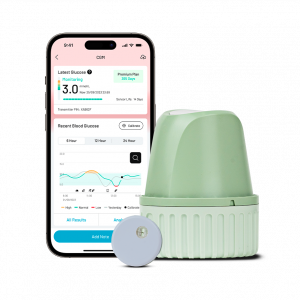The Blood Sugar Rollercoaster: How Alcohol Impacts Glucose and Insulin Sensitivity
Published on:December 26 2024

Photo by Quan Nguyen on Unsplash
The festive season brings joy, celebration, and the occasional festive indulgence. With Christmas, New Year and Chinese New Year all being so close to each other, the celebratory mood is strong, and the temptation to indulge in festive drinks even stronger.
For those managing their blood sugar levels, however, navigating alcohol consumption can be tricky. Alcohol affects not only your blood glucose levels but also your body’s insulin sensitivity, making it crucial to understand its impact. Here’s how you can make informed choices to maintain your health while enjoying the festive spirit.
How Alcohol Affects Blood Sugar Levels
The way alcohol influences blood sugar depends on various factors, including the type of drink, the quantity consumed, and whether it’s paired with food. Understanding these factors allows individuals to choose drinks that align better with their health goals. For instance, opting for dry wines or spirits with unsweetened mixers can minimise glucose spikes, while avoiding sugary cocktails can prevent rapid blood sugar surges. Being informed about the types of alcohol and their effects empowers those managing diabetes to make decisions that mitigate risks and maintain stable glucose levels during celebrations.
Types of Alcohol and Their Effects
- Sugary Drinks: Cocktails, sweet wines, and liqueurs contain high levels of sugar, causing a rapid spike in blood glucose. For people with diabetes, these can present significant challenges due to the potential for sharp and unpredictable glucose surges.
- Beer: While lower in sugar, beer is rich in carbohydrates, leading to a slower but steady rise in blood glucose. Choosing light beer varieties can reduce the carbohydrate load, making them slightly more manageable.
- Dry Wines and Spirits: Dry wines, such as red or white varietals with low residual sugar, are generally safer choices for maintaining stable blood glucose. Similarly, spirits like vodka, gin, or whisky, when consumed in moderation and mixed with unsweetened mixers like soda water, have minimal impact on blood sugar levels. These options are often recommended for individuals managing diabetes, provided they’re consumed responsibly and paired with food.
- Sugary Drinks: Cocktails, sweet wines, and liqueurs contain high levels of sugar, causing a rapid spike in blood glucose. This can be particularly problematic for people with diabetes.
- Beer: While lower in sugar, beer is rich in carbohydrates, leading to a slower but steady rise in blood glucose.
- Dry Wines and Spirits: Dry wines, light beers, and spirits mixed with unsweetened mixers like soda water have minimal sugar content and are less likely to cause significant glucose spikes. These options are more suitable for individuals managing diabetes.
How Alcohol Impacts Glucose Levels
Once your body begins metabolising alcohol, blood glucose levels can drop. This is because the liver prioritises breaking down alcohol over releasing stored glucose into the bloodstream. For individuals with diabetes, this can lead to hypoglycaemia (low blood sugar), especially if alcohol is consumed on an empty stomach or alongside insulin.
Additional Influencing Factors

Photo by krakenimages on Unsplash
- Food Pairings: Eating while drinking slows alcohol absorption and stabilises blood sugar levels. High-protein or high-fibre foods, such as nuts or cheese, work best. Pairing food with alcohol can also reduce the risk of hypoglycaemia, as it helps maintain a steadier release of glucose into the bloodstream, balancing the effects of alcohol on liver function.
- Quantity of Alcohol: Moderate drinking is less disruptive, while excessive consumption can cause pronounced blood sugar fluctuations. By limiting alcohol intake to one or two standard drinks, individuals can better manage glucose variability and avoid significant peaks or drops in blood sugar levels.
- Individual Health Conditions: People with diabetes or metabolic disorders experience more pronounced effects due to compromised glucose regulation. Knowing your own health condition and understanding how your body reacts to alcohol is crucial for managing risks. For instance, those with a history of severe hypoglycaemia should take extra precautions and consult their healthcare provider if unsure about drinking safely.
By considering these influencing factors, individuals can take proactive steps to manage their health during festive celebrations. Understanding how alcohol interacts with food, quantity, and personal health conditions allows for smarter decision-making and a safer holiday experience.
Alcohol and Insulin Sensitivity
Alcohol also affects how your body responds to insulin, the hormone responsible for regulating blood glucose.
Short-Term Effects
After drinking, your body may temporarily become more sensitive to insulin, which can cause a rapid drop in blood sugar levels, especially if consumed on an empty stomach. While this might seem beneficial, it’s a fleeting effect and can lead to hypoglycaemia.
Long-Term Effects
Chronic alcohol consumption can have the opposite effect, leading to insulin resistance. Over time, this condition makes it harder for your body to regulate glucose levels, increasing the risk of Type 2 diabetes. Excessive drinking also contributes to weight gain, liver damage, and inflammation, which further impair insulin sensitivity.
Tips for Managing Alcohol and Blood Sugar During the Holidays
You can enjoy festive drinks responsibly with these strategies:
- Opt for Lower-Sugar Drinks: Choose dry wines, light beers, or spirits mixed with soda water or other unsweetened mixers. These options are more suitable for diabetics who wish to minimise glucose spikes.
- Avoid Drinking on an Empty Stomach: Always pair alcohol with food. Snacks rich in protein or fibre, such as nuts, cheese, or whole-grain crackers, help stabilise glucose levels.
- Monitor Blood Sugar Levels: Check your glucose before and after drinking to understand its effects on your body. This is particularly important if you use insulin or diabetes medications.
- Stay Hydrated: Alcohol dehydrates your body, which can make blood sugar management more challenging. Alternate alcoholic drinks with water to stay hydrated.
- Be Prepared for Hypoglycaemia: Carry glucose tablets or fast-acting carbohydrates in case your blood sugar drops unexpectedly.
Moderation and Long-Term Health
 Moderation is key to enjoying alcohol without compromising your health. A glass of dry wine or light beer may have minimal impact, but excessive consumption can lead to significant blood sugar fluctuations and long-term health complications. For those managing diabetes, thoughtful choices and mindfulness are essential.
Moderation is key to enjoying alcohol without compromising your health. A glass of dry wine or light beer may have minimal impact, but excessive consumption can lead to significant blood sugar fluctuations and long-term health complications. For those managing diabetes, thoughtful choices and mindfulness are essential.
To better understand how your body responds to alcohol, food, and exercise, BUZUD’s Continuous Glucose Monitor (CGM) offers invaluable insights. With real-time glucose tracking, the CGM empowers you to make informed decisions, especially during the festive season when routines and diets often change.
Whether you’re managing diabetes or simply aiming to optimise your health, BUZUD’s CGM helps you maintain stability and peace of mind. Celebrate joyfully and healthily by staying informed and prioritising balance this festive season.
The Blood Sugar Rollercoaster: How Alcohol Impacts Glucose and Insulin Sensitivity






